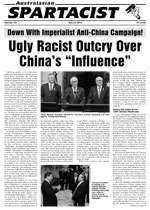
The Fight for Gay Rights, Then and Now In February, Spartacist League (SL) supporters in Sydney attended “Out In The Streets: A History of LGBTIQ Activism in Sydney,” a meeting celebrating 40 years since the first Sydney gay Mardi Gras. Hosted by the City of Sydney, Sydney’s Pride History Group and others, the event was promoted using a 1978 photo featuring SL signs (see photo on right). Indeed, it took the intervention of our supporters to inject real political history into the meeting, much to the chagrin of some present. As one comrade remarked, there was more history in the photo than came from the podium. In 1978 gay sex was still a major criminal offence in most Australian states. Much of the left, from the Maoists to the precursor of the Socialist Equality Party, were hostile to the struggle for gay rights. Other reformist groups, such as the precursors to Socialist Alliance, Socialist Alternative and Solidarity, pushed sectoralist politics, whereby gays and other oppressed groups in society were to organise and mobilise separately, independent of the class struggle. In this way, these reformists could avoid challenging the anti-gay prejudice instilled in the working class by church and state, and their Laborite misleaders. In contrast, the SL fought then, as now, for full democratic rights for homosexuals as part of a broader fight for the working class to take up defence of all the oppressed. When scores of marchers at the 1978 Mardi Gras were arrested and bashed by the cops of the NSW Wran Labor government, we fought for united-front working-class-centred defence of those busted. As our supporter stated at the February event, “We were proud to have organised defence of those arrested and we took arrests.” Looking to the immense social power of the trade unions, we wrote at the time, “the same cops who break up gay-rights marches also break up strike pickets! An injury to one is an injury to all!” However, a broad united-front campaign centred on the labour movement was sabotaged by reformists ensconced in the Gay Solidarity Group. They did not want to go up against the ALP government that they supported. Opposed to a revolutionary program they were left with nothing but appeals to the very state whose cops were busting and brutalising protesters. In today’s reactionary climate, conditioned by the fall of the Soviet Union, the Mardi Gras parade has become a huge commercial enterprise replete with big business floats, contingents of cops, and attended by Liberal politicians. Likewise, the recent fight for same-sex marriage has been shaped by a socially conservative campaign, with its drive for bourgeois respectability and embellishing of the institution of the family. In defending the democratic right of gay marriage, and divorce, we note that homosexual oppression, and that of women, stems fundamentally from the bourgeois family, a key prop of capitalism. Only the destruction of capitalism through workers revolution will lay the basis for replacing the family by providing the material means to socialise and collectivise its functions. Doubtless, comfortable ex-70s “radicals” in the audience were horrified to be reminded of the prominent role the SL played in the fight against gay and lesbian oppression. Out of this struggle we won class-conscious gay militants to our revolutionary banner. Today we continue to strive to build a proletarian vanguard party, the necessary instrument to lead the most conscious layers of the working class, at the head of all the oppressed, in the fight to sweep away the deeply oppressive and exploitative capitalist system.
|
|
||||||||||||||||||||||||||||||||||||||||||
